英语1(基础模块)第2版 unit 2 知识点及练习
中专英语1(基础模块)unit2
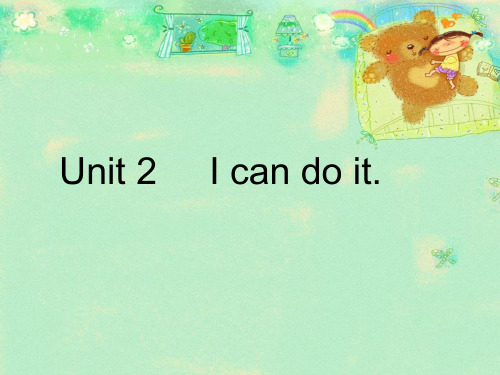
Listening and speaking
3. Listening and Speaking
( ) a. I can drive a car. ( ) b. I can swim. ( ) c. I can use the computer. ( ) d. I can play basketball. ( ) e. I can serve visitors. [‘vɪzɪtə(r)] (为游客服务) ( ) f. I can speak English.
这些方法适用于英语学习。
Language in use (Grammar focus)
Can 的练习题
二、把下列句子变为否定句。
• 1、Lingling ccaan’t ride a horse. • 2、He ccaann’t speak Chinese. • 3、Lingling and Daming ccana’nt play the
apply的用法搭配
2. apply to 适用(运用)于 如: 1)The book does not apply to beginners.
这书不适合于初学者。
注:该结构中的 to 为介词,若后接动词,要用动名词。 如:These methods apply to learning English.
2) He didn’t use his ink. He used mine.
他没有用他自己的墨水,他用了我的。
3) That book is hers, not yours. 那本书是她的,不是你的。
重点词汇和句型
三、反身代词表示“我自己”、“你自己”、“他自己”、“我们自己”、
“你们自己“”他们自己“等代词, 也称”自身代词“。反称代词有人
英语基础模块1-unit2-i-can-do-it-课件
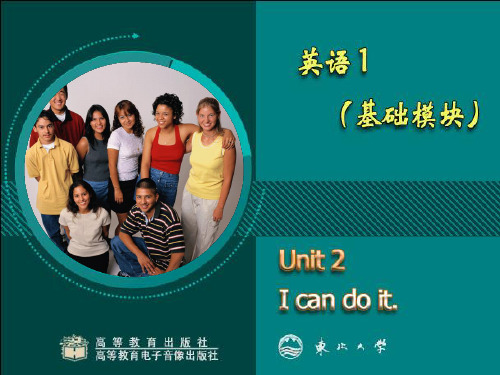
Mr Zhang: Can you sing English songs?
Bill:
Yes, I can.
Mr Zhang: That’s good.
Activity 7
Listen and repeat. 跟读对话,学说选出的语句。
Bill:
Good morning, sir!
Mr Zhang: Good morning! Your name, please?
Activity 5
Listen and circle. 听录音,在活动4的字母序号上圈出张 青能做的事。
a. I can drive a car.
c. I can use the computer.
e. I can serve visitors.
Activity 6
Read and underline. 阅读对话,用下画线标出询问和谈 论能力的语句。
Activity 2
Listen and circle. 听录音,圈出上图中Ben能做的事。
1) I can speak Chinese.
5) I can teach English. 6) I can drive cars.
Activity 3
Think and talk. 想一想,与同伴谈论自己能做的事。
教学目标
语言知识目标: 学生能够理解并运用常用动词及can 询问并给出有关个人能力的信息。 语言技能目标: 听 —— 学生能够理解用情态动词can 表述的有关个人能力的介绍。 说 —— 学生能够用情态动词can 做有关个人能力的介绍。 读 —— 学生能够读懂有关个人信息及个人能力的表格及简单句。 写 —— 学生能够根据个人情况做简单介绍并用情态动词can 表述个人能力。 学 习 策 略: 学生在英语学习中发现问题并及时寻求解决方法。 文 化 意 识: 学生掌握中国人与英美国家的人们在询问个人信息时的不同习惯。 情 感 态 度: 学生了解不同职业所需的技能,并明确自己在学习过程中需要掌握的技能。 单 元 任 务: 学生能够运用所学语言填写简单的求职表。
中职高教版英语1基础模块

a personal name cardanddescribetheoccupationof others.
教学内容题 目
职业岗位知识点、能力点
与基本职业素质点
目标水平
识记
理解
熟练操作
应用
分析
Readingand Writing
知识点:Masterthegrammar structure Verb“be”pronouns.
【主要教学内容】
Content:
the words about name card and vocation.eg:telephone number; age; address; e-mail address; job (engineer; manager; secretary; teacher; student; doctor; nurse; singer; fans); position(boss)
2)about greeting:Good to meet you.
3)about personal information:What’s you name Where are you from Which company are you from
designpersonalname card.
【主要能力点与知识点应达到的目标水平】
the meaning of“last name”and“first name”.
9. Read and underline. Practice the dialogue with your partner and underline the sentences aboutasking one’s personal information.
word完整版牛津高中英语模块一unit2知识点讲解
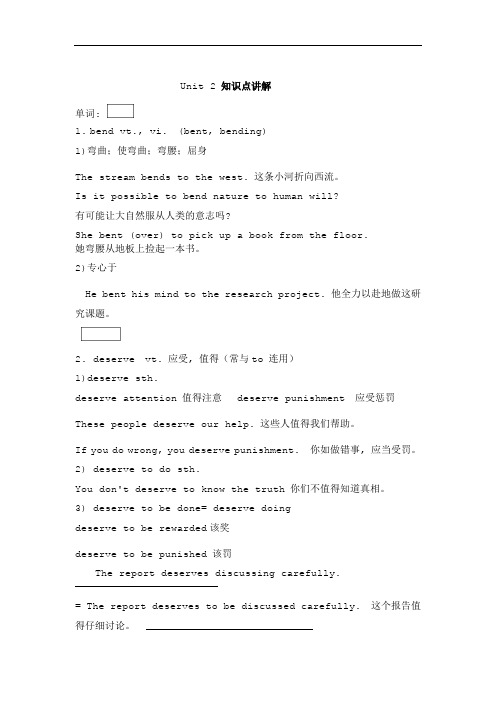
Unit 2 知识点讲解单词:1.bend vt., vi. (bent, bending)1)弯曲;使弯曲;弯腰;屈身The stream bends to the west. 这条小河折向西流。
Is it possible to bend nature to human will?有可能让大自然服从人类的意志吗?She bent (over) to pick up a book from the floor.她弯腰从地板上捡起一本书。
2)专心于He bent his mind to the research project. 他全力以赴地做这研究课题。
2. deserve vt. 应受, 值得(常与to 连用)1)deserve sth.deserve attention 值得注意 deserve punishment 应受惩罚These people deserve our help. 这些人值得我们帮助。
If you do wrong, you deserve punishment. 你如做错事, 应当受罚。
2) deserve to do sth.You don't deserve to know the truth 你们不值得知道真相。
3) deserve to be done= deserve doingdeserve to be rewarded该奖deserve to be punished 该罚The report deserves discussing carefully.= The report deserves to be discussed carefully. 这个报告值得仔细讨论。
3. expect vt. expect (sb.) to do sth.1) 预料;预期I expect he'll pass the examination. 我预料他会通过考试。
高一牛津英语模块1模块2基础知识练习(共9套)
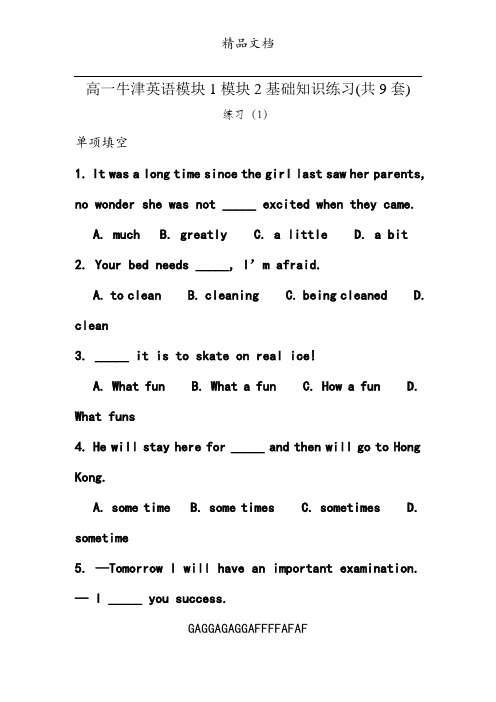
高一牛津英语模块1模块2基础知识练习(共9套)练习(1)单项填空1. It was a long time since the girl last saw her parents,no wonder she was not _____ excited when they came.A. muchB. greatlyC. a littleD. a bit2. Your bed needs _____, I’m afraid.A. to cleanB. cleaningC. being cleanedD. clean3. _____ it is to skate on real ice!A. What funB. What a funC. How a funD.What funs4. He will stay here for _____ and then will go to Hong Kong.A. some timeB. some timesC. sometimesD. sometime5. —Tomorrow I will have an important examination. — I _____ you success.GAGGAGAGGAFFFFAFAFA. hopeB. wishC. hope forD. wish for6. She seems never to be tired; she has many ways to make herself _____.A. relaxedB. relaxingC. worriedD. worrying7. Mr. Smith as well as his wife and daughter, _____ to their school twice.A. have goneB. has goneC. have beenD. has been8. I’m lucky to have got two tickets _____. Are you _____ to go to the concert with me?A. freely; freeB. for free; freelyC. freely; for freeD. for free; free9. —I’m sorry to have troubled you. —_____.GAGGAGAGGAFFFFAFAFA. Not to mentionB. Don’t mention itC.All right. D. With pleasure.10. It’s a pity that you missed _____ the chance to go abroad for further education.A. to giveB. to be givenC. givingD. being given11. He is a man of _______ and he had a lot of interesting _______ in his life.A. much experience, experiencesB. many experiences, experienceC. much experience, experienceD. many experiences, experiences12. There _____ a tall tree in front of the building over there, didn’t there?A. wasB. would beC. must beD. used to be13. Do be careful next time, _____?A. will youB. do youC. don’t youD.are n’t youGAGGAGAGGAFFFFAFAF14. You must officially ____ any course you are notattending.A. fallB. dropC. learnD. join15. There’s about 400mm rain fall in this area a year _____A. on averageB. in averageC. of averageD. for average答案与简析单项填空1. C。
英语1(基础模块)第2版--unit-2-知识点及练习
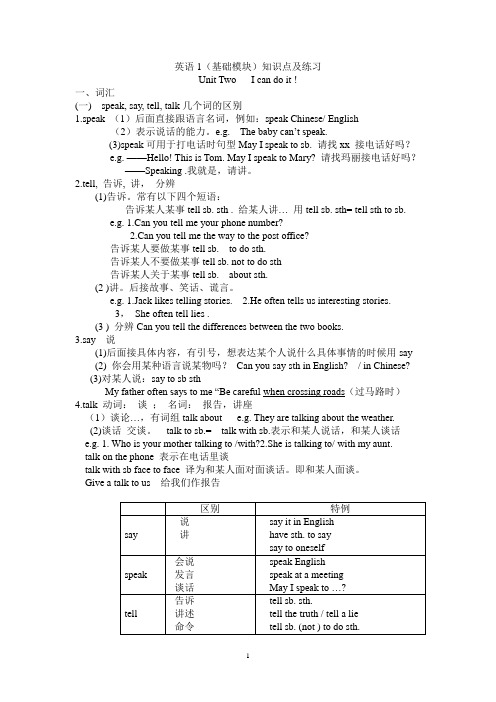
英语1(基础模块)知识点及练习Unit Two I can do it !一、词汇(一) speak, say, tell, talk几个词的区别1.speak (1)后面直接跟语言名词,例如:speak Chinese/ English(2)表示说话的能力。
e.g. The baby can’t speak.(3)speak可用于打电话时句型May I speak to sb. 请找xx 接电话好吗?e.g. ——Hello! This is Tom. May I speak to Mary? 请找玛丽接电话好吗?——Speaking .我就是,请讲。
2.tell, 告诉, 讲,分辨(1)告诉。
常有以下四个短语:告诉某人某事tell sb. sth . 给某人讲… 用tell sb. sth= tell sth to sb.e.g. 1.Can you tell me your phone number?2.Can you tell me the way to the post office?告诉某人要做某事tell sb. to do sth.告诉某人不要做某事tell sb. not to do sth告诉某人关于某事tell sb. about sth.(2 )讲。
后接故事、笑话、谎言。
e.g. 1.Jack likes telling stories. 2.He often tells us interesting stories.3,She often tell lies .(3 ) 分辨Can you tell the differences between the two books.3.say 说(1)后面接具体内容,有引号,想表达某个人说什么具体事情的时候用say(2) 你会用某种语言说某物吗?Can you say sth in English? / in Chinese?(3)对某人说:say to sb sthMy father often says to me “Be careful when crossing roads(过马路时)4.talk 动词:谈;名词:报告,讲座(1)谈论…,有词组talk about e.g. They are talking about the weather.(2)谈话交谈。
中职英语基础模块一 Unit 2 Transportation(考点串讲+精练)
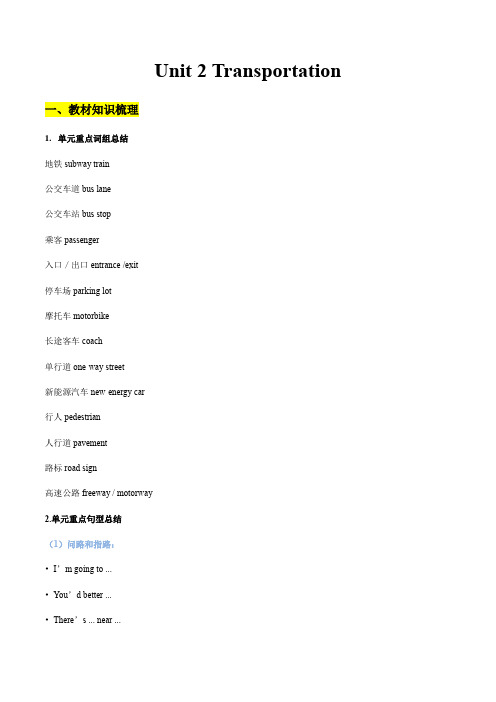
Unit 2 Transportation一、教材知识梳理1.单元重点词组总结地铁subway train公交车道bus lane公交车站bus stop乘客passenger入口/出口entrance /exit停车场parking lot摩托车motorbike长途客车coach单行道one-way street新能源汽车new-energy car行人pedestrian人行道pavement路标road sign高速公路freeway / motorway2.单元重点句型总结(1)问路和指路:•I’m going to ...•You’d better ...•There’s ... near ...•How long will it take by ... ?•Don’t worry about it.•It would be•Excuse me, could you tell me how to get to ... ? /Excuse me, how can I get to ... ?/ Excuse me, where is ... ?/Excuse me, is there a ... nearby?•I’m going to ...•You’d better ...•There’s ... near ...•How long will it take by ... ?3.单元语法总结祈使句的概念祈使句是用于表达命令、请求、劝告、警告、禁止等的句子。
祈使句因对象(主语)是第二人称,通常省略主语。
祈使句的时态都为一般现在时,句末可以用感叹号来表达比较强烈的语气,也可以用句点结尾。
命令:Go and wash your hands!去洗一下你的手!请求:Be quiet,please. 请安静。
劝告:Be kind to your friends.善待你的朋友。
警告:Watch your steps.注意台阶。
(完整版)英语1(基础模块)第2版-unit-2-知识点及练习,推荐文档.docx
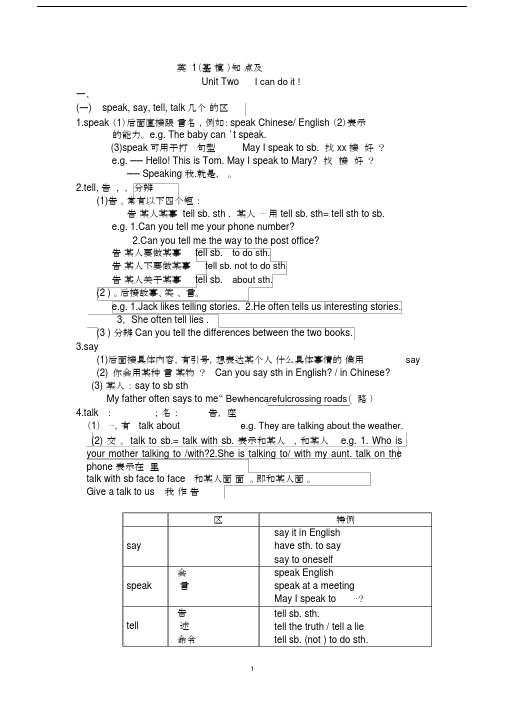
英 1(基模)知点及Unit Two I can do it !一、(一) speak, say, tell, talk几个的区1.speak (1)后面直接跟言名,例如:speak Chinese/ English (2)表示的能力。
e.g. The baby can ’t speak.(3)speak可用于打句型May I speak to sb. 找 xx 接好?e.g. —— Hello! This is Tom. May I speak to Mary? 找接好?—— Speaking 我.就是,。
2.tell, 告 , ,分辨(1)告。
常有以下四个短:告某人某事 tell sb. sth . 某人⋯用 tell sb. sth= tell sth to sb.e.g. 1.Can you tell me your phone number?2.Can you tell me the way to the post office?告某人要做某事tell sb.to do sth.告某人不要做某事tell sb. not to do sth告某人关于某事tell sb.about sth.(2 )。
后接故事、笑、言。
e.g. 1.Jack likes telling stories. 2.He often tells us interesting stories.3, She often tell lies .(3 ) 分辨 Can you tell the differences between the two books.3.say(1)后面接具体内容,有引号,想表达某个人什么具体事情的候用say(2)你会用某种言某物? Can you say sth in English? / in Chinese?(3)某人: say to sb sthMy father often says to me“ Bewhencarefulcrossing roads(路)4.talk :;名:告,座(1)⋯,有 talk about e.g. They are talking about the weather.(2) 交。
Unit 2 英语1 (基础模块)第二版

I Grammar focus You He / She / It
I You He / She / It Can We You …?
We
You They
can / can’t …
They
I You He / She / It Yes, can No,
I you he / She / It Can’t
speak Chinese teach English drive a car read in Chinese repair computers serve customers
serve customers. I can ______________________
1. Look and complete.
speak Chinese teach English drive a car read in Chinese repair computers serve customers
repair computers. I can ______________________
1. Look and complete.
Objective Sales Manager Abilities I can use the computer. I can speak English. I can read and write in English. …
( (
) a. His name’s Wang Tong. ) c. He can speak English.
5. Listen and complete.
Name: From:
Zhang Qing Qingdao 28
Age:
……
6. Listen, read and underline.
中职英语 基础模块1 Unit2
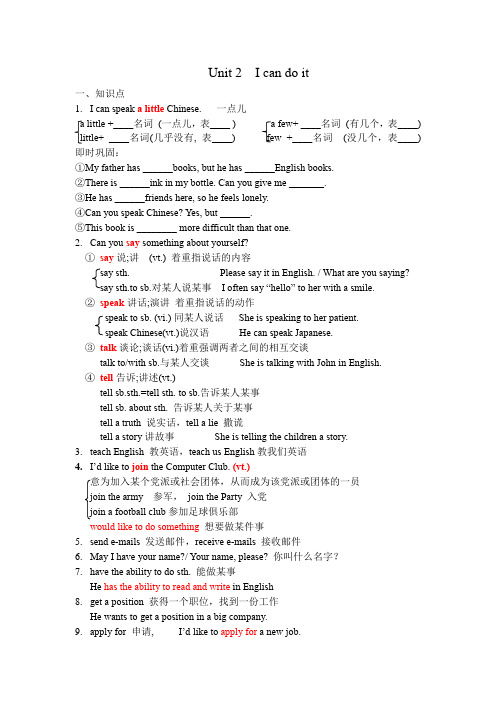
Unit 2 I can do it一、知识点1.I can speak a little Chinese. 一点儿a little +____名词(一点儿,表____ ) a few+ ____名词(有几个,表____) little+ ____名词(几乎没有, 表____) few +____名词(没几个,表____) 即时巩固:①My father has ______books, but he has ______English books.②There is ______ink in my bottle. Can you give me _______.③He has ______friends here, so he feels lonely.④Can you speak Chinese? Yes, but ______.⑤This book is ________ more difficult than that one.2.Can you say something about yourself?①say说;讲(vt.) 着重指说话的内容say sth. Please say it in English. / What are you saying?say sth.to sb.对某人说某事I often say “hello” to her with a smile.②speak讲话;演讲着重指说话的动作speak to sb. (vi.)同某人说话She is speaking to her patient.speak Chinese(vt.)说汉语He can speak Japanese.③talk谈论;谈话(vi.)着重强调两者之间的相互交谈talk to/with sb.与某人交谈She is talking with John in English.④tell告诉;讲述(vt.)tell sb.sth.=tell sth. to sb.告诉某人某事tell sb. about sth. 告诉某人关于某事tell a truth 说实话,tell a lie 撒谎tell a story讲故事She is telling the children a story.3.teach English 教英语,teach us English教我们英语4.I’d like to join the Computer Club.(vt.)join the army 参军,join the Party 入党join a football club参加足球俱乐部would like to do something想要做某件事5.send e-mails 发送邮件,receive e-mails 接收邮件6.May I have your name?/ Your name, please? 你叫什么名字?7.have the ability to do sth. 能做某事He has the ability to read and write in English8.get a position 获得一个职位,找到一份工作He wants to get a position in a big company.9.apply for 申请, I’d like to apply for a new job.10.I can serve customers 为顾客服务,serve sb. 为某人服务11.get upset 感到不安Now, don’t get upset about your illness.get angry变得生气If you do that again, I'll get angry.二、语法: can 的用法情态动词;没有人称和数的变化;后接动词原形;①表示能力,意为“能、会”,可与be able to转换。
中职英语基础模块1第2版Unit Test (Unit 2)测试题Unit 2
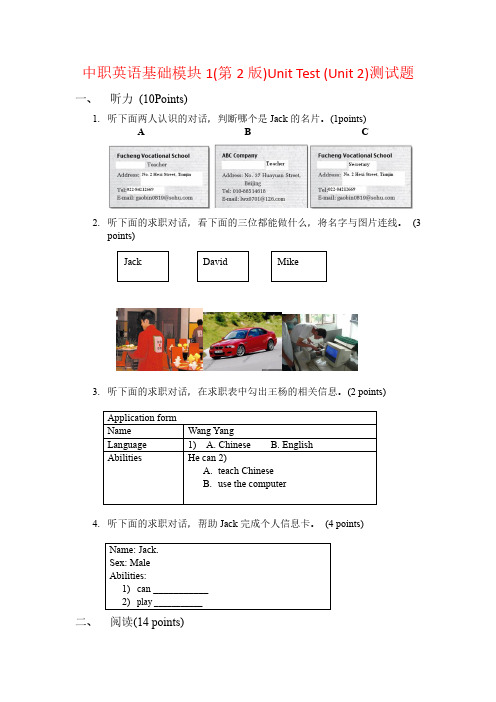
中职英语基础模块1(第2版)Unit Test (Unit 2)测试题一、听力(10Points)1.听下面两人认识的对话,判断哪个是Jack的名片。
(1points)A BC2.听下面的求职对话,看下面的三位都能做什么,将名字与图片连线。
(3points)3.听下面的求职对话,在求职表中勾出王杨的相关信息。
(2 points)4.听下面的求职对话,帮助Jack完成个人信息卡。
(4 points)二、阅读(14 points)1.假设你是经理,阅读Jane的求职表,判断她能胜任哪份工作。
(4 points)A. B.2.A. B. C.3.阅读下面的四份求职表,完成下面的判断,把名字写在相应的空格内.(41)________ can join the basketball club.2)________ can join the teachers’ club.3)________ can join the IT club.4)________ can join the waiters’ club.4.下面是王扬的一些个人信息,请把这些信息放入求职表适当的位置(只填写字母即可),帮助他完成求职表。
(4points)A. Wangyang,B. 20C. 1234449999,D. ****************,E. He can speak English. He can drive cars.三、语言应用(18 points)1.阅读下面的对话,选择适当的选项补全对话使其完整。
(6 points)A.I’d like toB. say somethingC. application formD. Can youE. teach EnglishF. positionDialogue AA: Good morning. What 1)___________ do you apply for?B: A waiter.A: 2)_________ you speak Chinese?B: Yes, I can.A: Good. Fill in this 3)_________ please.Dialogue BA: Welcome to our club. Can you 4______ about yourself?B. Yes. I can 5)________.A: You want to be a teacher?B: Yes. 6)________ your club and teach English.2.下面是丁丁的个人信息,请参照图片帮助她完成她的求职表. (8 points)Ding Ding, 26,010-***********************can:3.模仿下面的海报,根据提示帮助用人单位完成招聘海报信息。
模块一unit 2 基础知识复习
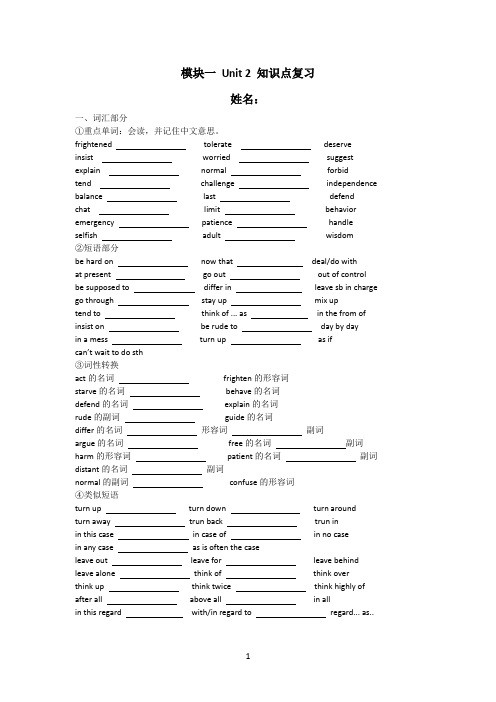
模块一Unit 2 知识点复习姓名:一、词汇部分①重点单词:会读,并记住中文意思。
frightened tolerate deserveinsist worried suggest explain normal forbidtend challenge independence balance last defendchat limit behavior emergency patience handle selfish adult wisdom②短语部分be hard on now that deal/do withat present go out out of control be supposed to differ in leave sb in charge go through stay up mix uptend to think of ... as in the from of insist on be rude to day by dayin a mess turn up as ifcan’t wait to do sth③词性转换act的名词frighten的形容词starve的名词behave的名词defend的名词explain的名词rude的副词guide的名词differ的名词形容词副词argue的名词free的名词副词harm的形容词patient的名词副词distant的名词副词normal的副词confuse的形容词④类似短语turn up turn down turn aroundturn away trun back trun inin this case in case of in no casein any case as is often the caseleave out leave for leave behind leave alone think of think overthink up think twice think highly of after all above all in allin this regard with/in regard to regard... as..1二课本重点句子1. 爸爸从假期回来比预期的早一天(p22 line 2)Dad arrive back from vocation a day earlier . (省略句)2. 你应当明天才回来啊(p22 line 9)You come home tomorrowbe supposed to短语not...until...句型3. 房子杂乱,地上是披萨饼盒子(P22 line18)The room , pizza boxes on the floor.4. 多一些的耐心和交流。
完整版高中英语模块一Unit2Growingpains单元总结复习知识清单牛津译林版1
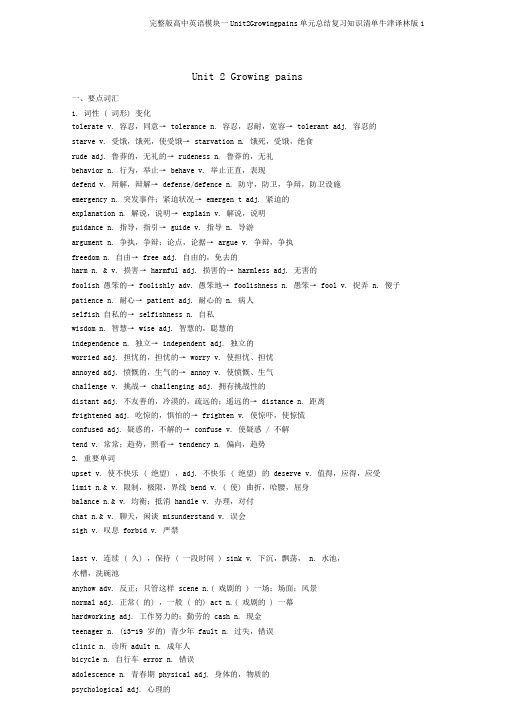
Unit 2 Growing pains一、要点词汇1. 词性 ( 词形) 变化tolerate v. 容忍,同意→ tolerance n. 容忍,忍耐,宽容→ tolerant adj. 容忍的starve v. 受饿,饿死,使受饿→ starvation n. 饿死,受饿,绝食rude adj. 鲁莽的,无礼的→ rudeness n. 鲁莽的,无礼behavior n. 行为,举止→ behave v. 举止正直,表现defend v. 辩解,辩解→ defense/defence n. 防守,防卫,争辩,防卫设施emergency n. 突发事件;紧迫状况→ emergen t adj. 紧迫的explanation n. 解说,说明→ explain v. 解说,说明guidance n. 指导,指引→ guide v. 指导 n. 导游argument n. 争执,争辩;论点,论据→ argue v. 争辩,争执freedom n. 自由→ free adj. 自由的,免去的harm n. & v. 损害→ harmful adj. 损害的→ harmless adj. 无害的foolish 愚笨的→ foolishly adv. 愚笨地→ foolishness n. 愚笨→ fool v. 捉弄 n. 傻子patience n. 耐心→ patient adj. 耐心的 n. 病人selfish 自私的→ selfishness n. 自私wisdom n. 智慧→ wise adj. 智慧的,聪慧的independence n. 独立→ independent adj. 独立的worried adj. 担忧的,担忧的→ worry v. 使担忧、担忧annoyed adj. 愤慨的,生气的→ annoy v. 使愤慨、生气challenge v. 挑战→ challenging adj. 拥有挑战性的distant adj. 不友善的,冷漠的,疏远的;遥远的→ distance n. 距离frightened adj. 吃惊的,惧怕的→ frighten v. 使惊吓,使惊慌confused adj. 疑惑的,不解的→ confuse v. 使疑惑 / 不解tend v. 常常;趋势,照看→ tendency n. 偏向,趋势2. 重要单词upset v. 使不快乐 ( 绝望) ,adj. 不快乐 ( 绝望) 的 deserve v. 值得,应得,应受limit n.& v. 限制,极限,界线 bend v. ( 使) 曲折,哈腰,屈身balance n.& v. 均衡;抵消 handle v. 办理,对付chat n.& v. 聊天,闲谈 misunderstand v. 误会sigh v. 叹息 forbid v. 严禁last v. 连续 ( 久) ,保持 ( 一段时间 ) sink v. 下沉,飘荡, n. 水池,水槽,洗碗池anyhow adv. 反正;只管这样 scene n.( 戏剧的 ) 一场;场面;风景normal adj. 正常( 的) ,一般 ( 的) act n.( 戏剧的 ) 一幕hardworking adj. 工作努力的;勤劳的 cash n. 现金teenager n. (13-19 岁的) 青少年 fault n. 过失,错误clinic n. 诊所 adult n. 成年人bicycle n. 自行车 error n. 错误adolescence n. 青春期 physical adj. 身体的,物质的psychological adj. 心理的- 1 -3. 重要词组can’t wait to do sth. 急不可待地去做某事 be supposed to do应当/ 应当⋯⋯do with /deal with办理,处理 be thought of as⋯被以为( 当作 )是⋯⋯turn up调高;出现,露面 be hard on对⋯⋯苛刻 (严苛)now that 既然,因为 mix up 混杂,弄乱;搅匀,拌和have difficulty (in)doing sth 做某事有困难have fun 玩得快乐,过得高兴insist on doing sth坚持做某事 at present 目前,目前turn out (to be)结果 ( 是) ,证明 (是) in a mess 一片狼籍,乌七八糟in this regard 在这方面 stay up 不睡觉,熬夜make decisions/choices 做决定 /选择 go through经历,经过,达成,检查Internet cafe 网吧 as if 恰似,仿佛along with 与⋯⋯一同,除了⋯⋯之外还look like 仿佛,看上去恰似feel like感觉,想要 trade ⋯ for ⋯用⋯⋯与⋯⋯互换be gone 用完了,不在了 give sb. a chance to do sth.给某人做某事的机遇4. 教材原句Welcome to the unit & reading(Ps21-25)1. 【教材原句】 But, but ⋯ you weren’t supposed to come home until tomorrow. (P22)可是,可是⋯⋯你们不是应当明日才回家的嘛!2. 【教材原句】 What did you do with the cash we left?(P23) 你们俩用我们留给你们的钱做什么了?3. 【教材原句】 Why is everything always my fault ? (P23)为何凡事老是我的错?Miss Xu made an error and mixed up myresults with someone else ’s! (P34)徐老师出了过失,把我的成绩和他人的成绩弄混了!4. 【教材原句】 Act Two, Scene One 第二幕,第一场(P23)5. 【教材原句】 Daniel has his arms crossed and looks upset . (P23)丹尼尔双臂抱在胸前,看起来很不快乐。
高一英语必修1unit2知识点
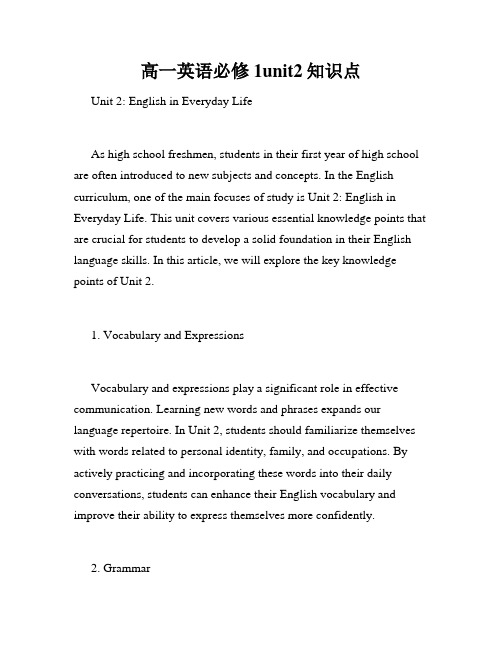
高一英语必修1unit2知识点Unit 2: English in Everyday LifeAs high school freshmen, students in their first year of high school are often introduced to new subjects and concepts. In the English curriculum, one of the main focuses of study is Unit 2: English in Everyday Life. This unit covers various essential knowledge points that are crucial for students to develop a solid foundation in their English language skills. In this article, we will explore the key knowledge points of Unit 2.1. Vocabulary and ExpressionsVocabulary and expressions play a significant role in effective communication. Learning new words and phrases expands our language repertoire. In Unit 2, students should familiarize themselves with words related to personal identity, family, and occupations. By actively practicing and incorporating these words into their daily conversations, students can enhance their English vocabulary and improve their ability to express themselves more confidently.2. GrammarGrammar forms the structural foundation of any language. In Unit 2, students will focus on various grammatical aspects, including verb tenses, sentence structures, and the correct usage of prepositions. It is important for students to grasp these grammar rules to construct grammatically correct and coherent sentences. Regular practice of grammar exercises and engaging in conversational activities will enhance students' understanding and application of English grammar.3. Reading ComprehensionUnit 2 includes a range of reading materials, such as articles, passages, and short stories. Reading comprehension exercises help students develop their reading skills, improve their understanding of the content, and enhance their overall language proficiency. Students should practice reading actively, highlighting key information, and understanding the main ideas and supporting details presented in the texts. Regular reading exercises will contribute to the development of critical thinking and analysis skills.4. Listening and SpeakingListening and speaking skills are essential for effective communication. In Unit 2, students will have opportunities to listen to audio clips, dialogues, and participate in discussions. By actively listening to different accents, intonations, and speech patterns, students can improve their listening comprehension. Engaging in class discussions and group activities will also enhance their speaking abilities, allowing them to express their thoughts and opinions fluently.5. Writing SkillsUnit 2 introduces various writing formats, such as personal narratives, descriptions, and emails. Students will learn to organize their thoughts and ideas coherently, structure their writing, and utilize appropriate vocabulary and grammar. Through constant practice and feedback, students will develop their writing skills, enabling them to effectively communicate through written English.Overall, Unit 2: English in Everyday Life is a vital part of the high school English curriculum. By mastering the knowledge points covered in this unit, students will build a solid foundation in English language skills. Regular practice, active participation in class activities, and dedicating effort to self-study are essential for the successful acquisition of these skills. Through continuous improvement andapplication, students will be well prepared for future English language challenges and effective communication in their everyday lives.。
英语同步学习指导(基础模块)1Unit 2 单元测试卷答案解析

Unit 2 We Are Friends一、语音(本大题共10小题,每小题1分,共计10分)从A、B、C、D 四个选项中,选出画线部分发音不同的一项。
1.A元音字母a在重读闭音节中读/æ/,在重读开音节中读/ei/2.C元音字母e在重读闭音节中读/e/,在非重读音节中读/i/3.A元音字母组合ou在shout,aloud,,around中读[au],在group中读[u:]4.A元音字母组合ex在重读元音前中读[igz],本身是重读音节,在非重读音节前读[eks]5.D辅音字母c一般读/k/,在字母e,i(y)前读/s/或/ʃ/6.D元音字母组合ea在重读音节中读[i:],在great中读[ei]7.D辅音字母组n一般读[n],在[k][g]音前读[ŋ]8.B元音字母组合ai在重读音节中读[ei]在非重读音节读[i]9. A e在重读音节中读[e],在非重读音节中读[i]10. C 词尾ed在浊辅音或元音后[d],在[t],[d]后读[id]二、单项选择(本大题共20小题,每小题1.5分,共计30分)从A、B、C三个选项中,选出空白处的最佳选项。
11. C “我想我可以及时道歉。
”make an apology道歉。
12. B “我很快就会成为你的近邻。
”close 作形容词,意思是“亲密的;亲近的;联系紧密的”;作动词是“关;合拢;不开放;停业;结束”。
closing含义是“结束的”;closely是副词,意思是“紧密地;接近地;严密地;亲近地”。
13. C “我爷爷非常喜欢给我所有的朋友提建议。
“be fond of喜爱……14. A “我的教学风格和其他老师差不多。
“be similar to... 类似于……;与……相似15. B “他让我们久等,我们很生气。
“get/be angry with sb. 生某人的气16. A “我们钦佩他在压力下的冷静。
”under pressure在压力下;被催逼17. A “你对我大喊大叫的时候,我听不见你说话。
英语基础模块修订版第二册第二单元
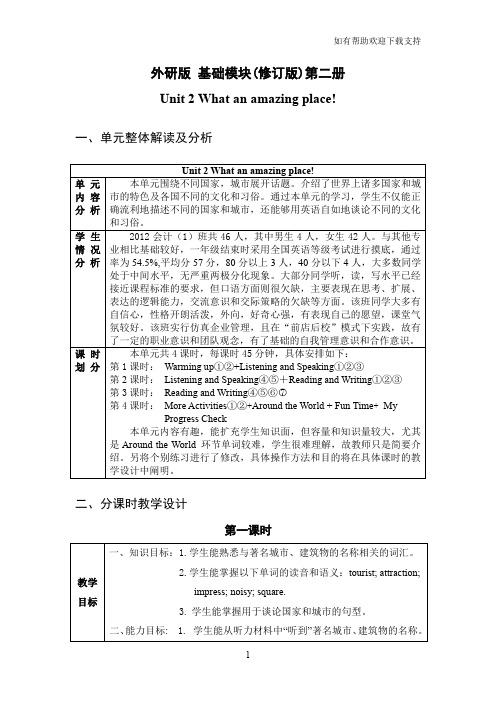
外研版基础模块(修订版)第二册
Unit 2 What an amazing place!
一、单元整体解读及分析
二、分课时教学设计
第一课时
第二课时
第三课时
第四课时
作者简介:陈晓峄,佛山市南海信息技术学校教师,扎根中职英语教学,用乐观的人生态度,严谨的工作态度赢得了师生的好评,不断努力,不断学习,磨砺自己,在完成了华南师范大学教育硕士的学习后继续探索。
其所著的论文,所做课件,网页均获得过全国、省、市、校各级奖项。
曾获第一届“外研社杯”全国中职英语教师教学技能大赛一等奖。
中职英语基础模块一Unit2完整教案 (2)
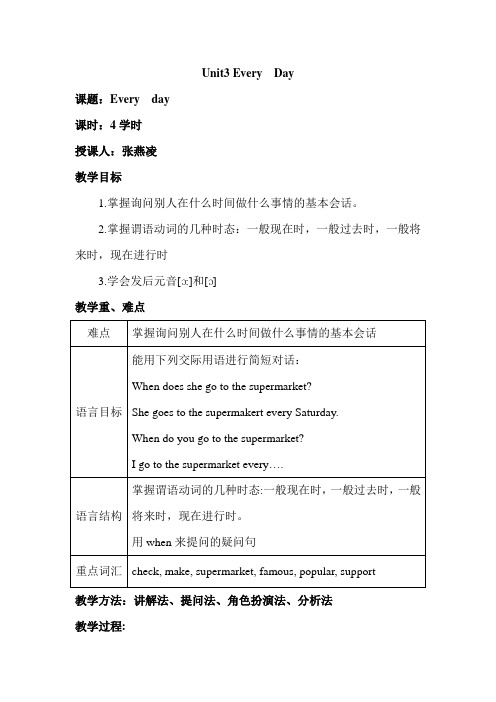
Unit3 Every Day课题:Every day课时:4学时授课人:张燕凌教学目标1.掌握询问别人在什么时间做什么事情的基本会话。
2.掌握谓语动词的几种时态:一般现在时,一般过去时,一般将来时,现在进行时3.学会发后元音[ɔ:]和[ɔ]教学重、难点教学方法:讲解法、提问法、角色扮演法、分析法教学过程:角色扮演(ROLE PLAY)1.明确口语活动的任务,要求学生仔细阅读图片。
必要时可做简单的对话示范。
2.成对活动,轮流作SpeakerA和SpeakerB。
3.学生教师巡视全班,聆听学生对话,并解答学生提出的问题。
4.挑出几个学生在班上表演。
5.总结学生的表现,必要时纠正学生中带普遍性的错误。
6.在黑板上写上January,Sunday,today,tomorrow,在每一个单词的第一个字母下面划线并指出一年中的月份和一星期中的每一天的单词首字母都要大写,而表示别的时间的单词不用大写。
语法:按照本单元中GRAMMAR的内容讲解一般过去时的方法。
此外还可以参照以下内容进行更细致的讲解。
一般过去时表示:(1) 过去某个特定时间发生,并且一下子就完成了的动作(即:非持续性动作),也可以表示(2) 过去习惯性的动作。
一般过去时不强调动作对现在的影响,只说明过去。
(1) I had a word with Julia this morning. 今天早晨,我跟朱丽亚说了几句话。
(2) He smoked many cigarettes a day until he gave up. 他没有戒烟的那阵子,烟抽得可凶了。
一般过去时常与表示过去的时间状语或从句连用,如:yesterday,last week,in 1993,at that time,once,during the war,before,a few days ago,when 等等。
句子中谓语动词是用一般过去时还是用现在完成时,取决于动作是否对现在有影响。
英语复习知识点精讲精练(基础模块2)Unit 1和2课件PPT

father n. 父亲; mother n. 母亲 36. trip n. 出行,旅行; travel v. & n. 旅行 ; tour n. 巡游 ; spring outing 春游
18. listen to music 听音乐 20. go to a club 去俱乐部
重点句型
1. How was your vacation? 你的假期过得怎么样? 2. It was wonderful/great/not bad. 很精彩/很棒/不错。 3. What was the weather like? 天气怎么样? 4. We had great fun. 我们玩得很开心。 5. Where did your family go? 你们一家去哪儿了? 6. What did you do there? 你们在那里都玩了什么? 7. What did you do last weekend? 上周末你做了什么? 8. What do you think of the movie? 你觉得这部电影怎么样?
14. band n. 乐队
15. rent v. 租用
16. order v. 订购
17. prefer v. 更喜欢
18. keep v. 保持
19. career n. 事业,生涯 20. beach n. 海滩; sands n. 沙滩 ; bank n. 河岸
21. sail v. 扬帆航行; sailing n. 帆船; sailor n. 水手
- 1、下载文档前请自行甄别文档内容的完整性,平台不提供额外的编辑、内容补充、找答案等附加服务。
- 2、"仅部分预览"的文档,不可在线预览部分如存在完整性等问题,可反馈申请退款(可完整预览的文档不适用该条件!)。
- 3、如文档侵犯您的权益,请联系客服反馈,我们会尽快为您处理(人工客服工作时间:9:00-18:30)。
英语1(基础模块)知识点及练习Unit Two I can do it !一、词汇(一) speak, say, tell, talk几个词的区别1.speak (1)后面直接跟语言名词,例如:speak Chinese/ English(2)表示说话的能力。
e.g. The baby can‟t speak.(3)speak可用于打电话时句型May I speak to sb. 请找xx 接电话好吗?e.g. ——Hello! This is Tom. May I speak to Mary? 请找玛丽接电话好吗?——Speaking .我就是,请讲。
2.tell, 告诉, 讲,分辨(1)告诉。
常有以下四个短语:告诉某人某事tell sb. sth . 给某人讲… 用tell sb. sth= tell sth to sb.e.g. 1.Can you tell me your phone number?2.Can you tell me the way to the post office?告诉某人要做某事tell sb. to do sth.告诉某人不要做某事tell sb. not to do sth告诉某人关于某事tell sb. about sth.(2 )讲。
后接故事、笑话、谎言。
e.g. 1.Jack likes telling stories. 2.He often tells us interesting stories.3,She often tell lies .(3 ) 分辨Can you tell the differences between the two books.3.say 说(1)后面接具体内容,有引号,想表达某个人说什么具体事情的时候用say(2) 你会用某种语言说某物吗?Can you say sth in English? / in Chinese?(3)对某人说:say to sb sthMy father often says to me “Be careful when crossing roads(过马路时)4.talk 动词:谈;名词:报告,讲座(1)谈论…,有词组talk about e.g. They are talking about the weather.(2)谈话交谈。
talk to sb.= talk with sb.表示和某人说话,和某人谈话e.g. 1. Who is your mother talking to /with?2.She is talking to/ with my aunt.talk on the phone 表示在电话里谈talk with sb face to face 译为和某人面对面谈话。
即和某人面谈。
Give a talk to us 给我们作报告1,Sorry, but I can‟t hear what you said just now?Could you _________ it again more slowly, please?2,The monitor asked the classmates to stop ____________ because he had something important to ___________ them.3. The students are about the film in the room.4. Please clearly.5. Two men are in front of the house.6. They can a little English.8. Can you me what time it is? 9. Mary , “What a nice idea!”1. He‟s going to borrow books from the library.2. This cup has milk in it .Please give me more.3. I have friends in Beijing.4. He knows only English.5. I got a letter from my friend ___ __ days ago .6. The text is difficult for you, there are new words in it.7. I have only friends, but they are all good friends.8. This question is difficult, ___ ___ student can answer it.9. Though this question is difficult, ____ __ students can answer it.10. Don‟t worry, there is _______ time before the train leaves.11. Don‟t worry, you still have time.12. Hurry up, there is ___ ___ time left.(三) 表示…人、语言‟ Chinese , English, French1,Chinese n. 中文,汉语(不可数名词);中国人(可数,单复同形)I am Chinese . We are Chinese.adj. 中国的,中国人的;2,English 英语,英国人(无复数)adj. 英语的,英国人的;He is English. He is an Englishman. He is an English boy.3,French 法语法国人(无复数)adj. 法语的,法国人的;He is French. He is a French man. He is a French boy.表示国家:China = the PRC , England = Britain = the UK , France. (四) in, 在……里面,用,穿in the room. 在房间里面,in English. 用英语,the girl in red. 那个穿红衣服的女孩二、短语Use the computer repair the computer drive a car read in Chinesein English teach English speak Chinese serve customers play basketball play baseball ride a bike what positionapply for want to be would like to do sth sales managerget upset (变得)不安get angry 生气三、句型1,Do you speak English?(你说英语吗?)是问你平时说英语吗?Can you speak English?(你能/会说英语吗?)can 指能\会做某事2,May I have your name, please? = What‟s your name? 你叫什么名字?3,How old are you? = What‟s your age? 你多大了?4,That‟s it. = That‟s all. 好了,到此为止。
5,I‟d like to = I would like to , would like : 想要。
后面可以接名词,不定式。
I would like a little water . I would like some apples.I would like to play basketball. I would like to ride a bike.(to后面接动词短语)四、语法情态动词can的用法can的意思,一表示能力:能、会;二表示许可:可以一、can的用法:情态动词can后面跟动词原形。
主语无论何种人称单复数,情态动词不能变。
二、情态动词can可以引导肯定句和疑问句。
1、肯定句:主语+ can + 动词原形+ 其他成分2、疑问句:can + 主语+ 动词原形+ 其他成分三、can 引导的肯定句变为疑问句的方法:(一调二改三问号)1、can 提前,首字母大写。
(一调)2、肯定句中主语在变成疑问句时的变化。
(二改)如:肯定句:You can see the animals. 你能看见动物。
疑问句:Can you see the animals? 你能看见动物吗?3、在句尾后面加问号。
(三问号)四、回答:1、肯定回答:Yes,主语(必须人称代词)+ can.2、否定回答:No,主语(必须人称代词)+ can not (can‟t).专题训练一、将下列句子变成一般疑问句并根据要求回答问题Example:Harry can run .(Yes)Can Harry run ? Yes , he can . He can run .1、Miss Smith can play ping-pong.(No)________________________________________________________________? _________________________________________________________________2、Jessie can play the drum(鼓) . (Yes)________________________________________________________________? _________________________________________________________________ 3、Tony can sing . (No)________________________________________________________________? _________________________________________________________________ 4、Nancy can draw a house .(Yes)________________________________________________________________? _________________________________________________________________ 5、Peter can play computer games .(Yes)________________________________________________________________? _________________________________________________________________二、根据划线部分提问例:I can play basketball. What can you play?I can play basketball. What can you do?1, Sara can swim._____________________________________________________________ 2, I can play the violin(小提琴) ._____________________________________________________________ 3, You can get pizzas .______________________________________________________________ 4, Sandy can read and write in English.______________________________________________________________ 5, We can wash the vegetables.______________________________________________________________二、翻译他会打棒球(baseball)。
